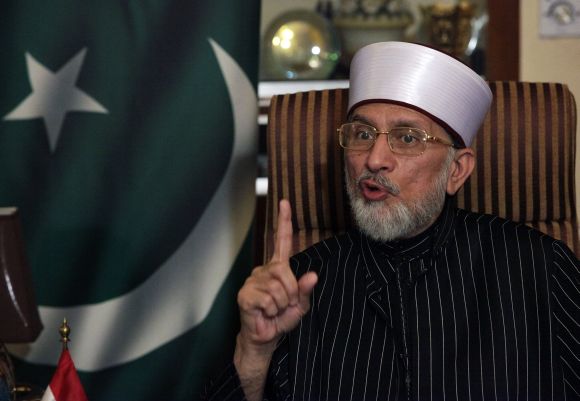 | « Back to article | Print this article |

The Pakistan government on Thursday agreed to appoint a caretaker prime minister by consensus ahead of the next general election as part of a deal struck with fiery cleric Tahir-ul-Qadri to end his protest near parliament that had put intense pressure on the country's fragile coalition.
"Today is victory for the masses of Pakistan; No one has seen such a large rally in the history of Pakistan; congratulations, many congratulations dear participants. The long march, Alhamdulillah, achieved its targets," said Qadri after signing an agreement with the government.
Qadri was holding a sit-in in the capital with thousands of his supporters for almost 68 hours and had vowed to remain unless revolutionary changes were not made to the political structure of the country.
As Qadri signed the agreement his followers started dancing, singing and termed him the real hero of the country. Qadri's followers also include women and children who spent almost 68 hours under the open sky and braved rains.
The main clauses of declaration were:
Under article 62 of the constitution, a member of parliament must be sagacious, righteous, and honest. Article 63 of the constitution says a parliamentarian will stand disqualified if he fails to pay a bank loan worth Rs 2 million or more for more than a year from the due date.
It says the member will also be disqualified if he defaults in payment of government dues and utility expenses, including telephone, electricity, gas and water charges in excess of Rs10, 000 for over six months.
But the sad side of the story is that nothing real was achieved from the long march. The only big achievement is that Qadri will be consulted when the caretaker PM will be nominated.
"There will be justice on Friday. You will have to stay on Thursday night, sleep here, go outside parliament and on Friday after 11 am, it will be the inaugural address of the people's democratic revolution; the PM and all the ministers are now ex-PM and ex-ministers. On Tuesday, when I will deliver a speech at D Square," he said.
Earlier, Qadri had said, "I will give you (the government) a deadline until Friday to dissolve the federal parliament and provincial assemblies. After that, the people's assembly will take charge."
However, he has now agreed that assemblies shall be dissolved before the scheduled time of March 16 -- even if it is one day earlier. Qadri entered into discussion with the government that he termed as 'Yazeedi Lashkar'.
He called his struggle as 'Hussaini Mission" but finally agreed to hold talks with the same people he had called the 'evil forces'.
Earlier, Qadri and Information Minister Qamar Zaman Kaira had criticised each other to such an extent that the latter ridiculed him by copying his style of speech during a press conference. But as the agreement was signed, both hugged each other and burst into laughter.
Another strong demand was the removal of Chief Election Commissioner Fakhruddin G Ibrahim and dissolution of election commission, but at the end he retracted from his earlier demands and just said 'some issues need more time to be resolved' so it will be discussed during the next meetings.
Kaira's remarks after the agreement were enough to show that the long march ended aimlessly when he told the media, 'No party has won or has lost'.
On December 23, 2012 as Qadri, returned to Pakistan, he declared that he will hold a 'Tahrir Square-like' gathering in Islamabad, on January 14, 2013. He had also claimed to bring four million people to Islamabad.
Although Qadri failed to turn Islamabad into Tahrir Square and to revolutionise the political structure of the country, he still claims that he has achieved his goals.